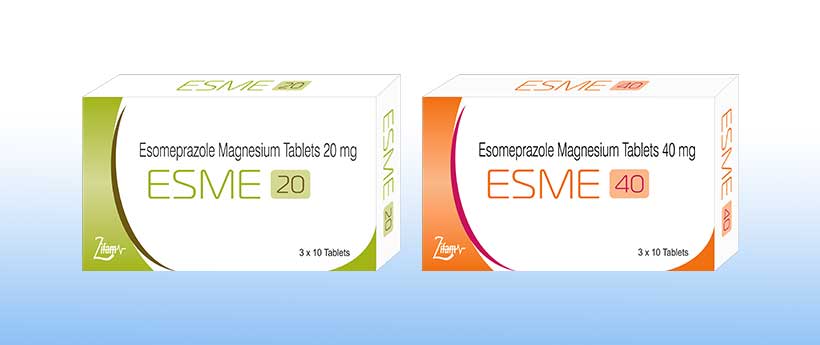ESME 20/40
- ENG
- မြန်မာ

ESME 20
Esomeprazole Magnesium Tablets 20 mg
COMPOSITION:
Each enteric coated tablet contains:
Esomeprazole Magnesium Trihydrate BP
BP equivalent to Esomeprazole… ….20 mg
ExcipientS……….q.s.
Colour: Brilliant Blue, Carmoisine, Ponceau 4R and Titanium Dioxide.
ESME 40
Esomeprazole Magnesium Tablets 40 mg
COMPOSITION:
Each enteric coated tablet contains:
Esomeprazole Magnesium Trihydrate BP
BP equivalent to Esomeprazole… ….40 mg
ExcipientS……….q.s.
Colour: Red Iron Oxide and Titanium Dioxide.
PHARMACOLOGICAL ACTION:
Esomeprazole is used to treat conditions in which there is too much acid in the stomach. It is used to treat duodenal ulcers and gastroesophageal reflux disease (GERD). This is a condition in which the acid in the stomach washes back up into the esophagus. It also reduces the chance of gastric ulcers in patients who use a group of medicines called NSAIDs and who may be at greater risk (i.e., patients 60 years of age or older or patients who have a history of gastric ulcers). Sometimes esomeprazole is used along with antibiotics to treat ulcers associated with infection caused by the H. pylori bacteria (germ). Esomeprazole works by decreasing the amount of acid produced by the stomach.
INDICATIONS:
Esomeprazole is indicated for H. pylori positive duodenal ulcers, as part of the eradication programme with appropriate antibiotics. Esomeprazole Magnesium Tablets is indicated for the prevention of relapse of gastro-oesophageal reflux. Esomeprazole Magnesium Tablets is indicated in the short-term management of mild functional dyspepsia.
CONTRA-INDICATIONS:
- Hypersensitivity to Esomeprazole.
- Pregnancy and lactation.
- Patients with liver impairment.
DOSAGE AND DIRECTIONS FOR USE:
The dose of Esomeprazole will be different for different patients. Follow your doctor’s orders or the directions on the label. The following information includes only the average doses of esomeprazole. If your dose is different, do not change it unless your doctor tells you to do so. The number of doses you take each day and the length of time you take the medicine depend on the medical problem for which you are taking esomeprazole
- To treat gastrosophageal reflux disease (GERD):
- Adults – 20 or 40 milligrams (mg) taken once a day for 4 to 8 weeks.
- Children up to 18 years of age – Use and dose must be determined by your doctor.
- To prevent gastrosophageal reflux disease (GERD):
- Adults – 20 mg taken once a day.
- Children up to 18 years of age – Use and dose must be determined by your doctor.
- To treat ulcers related to infection with H. pylori
- Adults 40 mg once daily, plus amoxicillin 1000 mg (1g) plus clarithromycin 500 mg, taken together before meals twice a day for ten days.
- Children up to 18 years of age – Use and dose must be determined by your doctor.
- To reduce chance of gastric ulcers in patients who are taking NSAIDs
- Adults – 20 or 40 mg taken once a day.
- Children up to 18 years of age – Use and dose must be determined by your doctor.
Missed dose – If you miss a dose of this medicine, take it as soon as possible. However, if it is almost time for your next dose, skip the missed dose and go back to your regular dosing schedule. Do not double doses.
The recommended once daily dosage should preferably be administered before a meal.
Maintenance treatment for the prevention of Gastro-oesophageal reflux:
One 20 mg tablet per day for up to one year. No clinical information is available for treatment longer than one year.
Functional Dyspepsia:
One 20 mg tablets daily for two to four weeks.
Children: The use of Esomeprazole in children has not been studied.
Elderly Patients:
No adjustment to the dose is necessary. The daily dose of 40 mg should not be exceeded.
Renal Insufficiency:
No dose adjustment is required in the presence of renal failure, including patients on dialysis.
SIDE EFFECTS AND SPECIAL PRECAUTIONS:
Gastro-intestinal:
Nausea, vomiting, diarrhea, constipation, abdominal pain, dry mouth, glossitis, taste abnormalities. Colitis which resolves on withdrawal of therapy may occur.
Neurological:
Headache, dizziness, somnolence, insomnia, tremor.
Skin:
Skin rash, urticaria, pruritus, alopecia in isolated cases
Hepatic reactions:
An increase in hepatic enzymes have been reported.
Haematological:
Thrombocytopenia, anaemia, leucopenia, neutropenia and eosinophilia have been reported rarely.
Other:
Asthenia, fever, oedema, arthralgia, myalgia, gynaecomastia, galactorrhoea in rare cases, blurred vision in isolated cases.
Esomeprazole Magnesium Tablets is not indicated for mild gastrointestinal complaints such as nervous dyspepsia. Prior to treatment the possibility of malignancy of gastric ulcer or a malignant disease of the esophagus should be excluded as treatment with Esomeprazole Magnesium Tablets may alleviate the symptoms of malignant ulcers and can thus delay diagnosis. Diagnosis of reflux esophagitis should be confirmed by endoscopy.
Drug Interactions:
Esomeprazole is a weak inducer of the cytochrome P450 enzyme system and the possibility exists that there may be interactions with drugs metabolised by this system. No interaction has been found with diazepam, oral contraceptives, prednisone, propranolol, phenytoin and theophylline. However, patients receiving concomitant warfarin should be monitored as minor reduction of the concentration of warfarin may occur.
No significant interaction with concomitantly administered antacids has been found.
KNOWN SYMPTOMS OF OVERDOSAGE AND PARTICULARS OF ITS TREATMENT:
Apart from symptomatic treatment, no specific therapeutic recommendation can be made in cases of over dosage.
STORAGE INSTRUCTIONS:
Store below 30’C in dry place. Protected from light.
KEEP MEDICINE OUT OF REACH OF CHILDREN.
PRESENTATION:
Alu-Alu pck of 10 Tablets.





